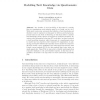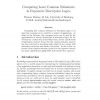351 search results - page 19 / 71 » Completing Description Logic Knowledge Bases Using Formal Co... |
102
click to vote
SEMWEB
2007
Springer
15 years 7 months ago
2007
Springer
Classical ontologies are not suitable to represent imprecise nor uncertain pieces of information. Fuzzy Description Logics were born to represent the former type of knowledge, but ...
ICFCA
2004
Springer
15 years 6 months ago
2004
Springer
The transfer of tacit knowledge is important in ensuring that an organisations most valuable assets do not walk out the door. While much controversy surrounds the definition of ta...
111
click to vote
RWEB
2009
Springer
15 years 7 months ago
2009
Springer
In this chapter we will introduce description logics, a family of logic-based knowledge representation languages that can be used to represent the terminological knowledge of an a...
103
click to vote
AUSAI
1999
Springer
15 years 5 months ago
1999
Springer
Computing least common subsumers in description logics is an important reasoning service useful for a number of applications. As shown in the literature, this reasoning service ca...
110
click to vote
CORR
2006
Springer
15 years 1 months ago
2006
Springer
Through the Internet and the World-Wide Web, a vast number of information sources has become available, which offer information on various subjects by different providers, often i...


